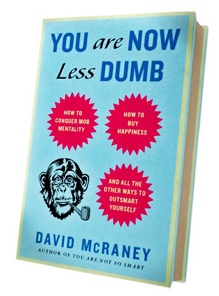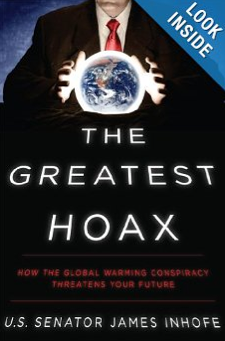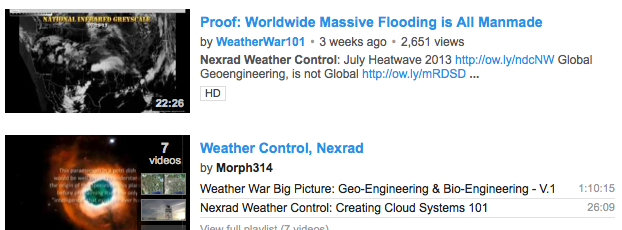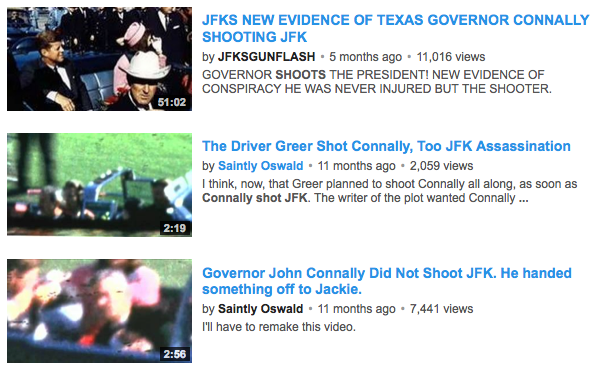1 September 2013
These Three Facts Will Make You Think Like A Scientist
Posted by Dan Satterfield
Critical thinking is harder than you think. Our minds are actually predisposed against it, but learning to reason is a necessity if you want to make good decisions. Failing to learn the basic skills of critical thought can be expensive, or even lead to making youtube videos like the ones I am interspersing through this blog post!
Here are three things that IMHO will make you a better critical thinker. If you have suggestions of your own, or a better way of putting it, I’m all ears!
1. Anecdotal evidence is not scientific truth.
We are hardwired by evolution to learn the first time not to stick our hand in a burning flame, and perhaps that is why we are so susceptible to ascribing anecdotal evidence as truth. Experience can help you avoid removing yourself from the gene pool before you’re able to reproduce, but it can also fool you into believing things that are not so. Correlation is not causation, but it does beg for some real research into the issue. In other words, anecdotal evidence begs scientific testing to find out what the truth really is.
2. Confirmation Bias messes with your mind.
 We all suffer from confirmation bias (CB) and must allow for it. David McRaney has a short and simple definition in his excellent book You Are Now Less Dumb:
We all suffer from confirmation bias (CB) and must allow for it. David McRaney has a short and simple definition in his excellent book You Are Now Less Dumb:
The Misconception: Your opinions are the result of years of rational, objective analysis.
The Truth: Your opinions are the result of years of paying attention to information which confirmed what you believed while ignoring information which challenged your preconceived notions.
The weather forecasts in the Farmers Almanac, and political pundits like Rush Limbaugh thrive on confirmation bias. So do vitamin companies and the homeopathic medicine crowd, and a classic example is the horoscope in your local paper. Congratulations, just knowing you suffer from CB is the first step to beating it!
 The second step is asking tough questions about new information, and the reliability of the source. For instance, Oklahoma Senator Jim Inhofe made his millions selling fossil fuels ( you know: oil, black gold, Texas tea), but he insists that climate change is a hoax perpetrated by a worldwide conspiracy of scientists. Ask yourself which is a more reasonable: thousands of scientists secretly faking research, or the opinion of every major scientific body on the planet? Keeping a secret is hard, just ask the NSA.
The second step is asking tough questions about new information, and the reliability of the source. For instance, Oklahoma Senator Jim Inhofe made his millions selling fossil fuels ( you know: oil, black gold, Texas tea), but he insists that climate change is a hoax perpetrated by a worldwide conspiracy of scientists. Ask yourself which is a more reasonable: thousands of scientists secretly faking research, or the opinion of every major scientific body on the planet? Keeping a secret is hard, just ask the NSA.
Confirmation bias is why millions believe the senator, instead of those who studied atmospheric physics. It also made him a lot of money because thousands also paid (to reinforce their preconceived notion) $17.56 for the hard cover of his book! Trust me, when I say there is a lot more real science in David McRaney’s book.
3. Science Never Proves Anything, But Scientific Method Is Mankind’s Greatest Invention.
Scientific method relies on common observations and reproducible experiment. If something is labeled as a scientific theory then it MUST be possible to design an experiment that COULD prove it wrong. If you can’t do it, then you have a belief instead of a theory. Don’t get fooled by one pretending to be the other.
 By the way, your belief may or may not be accurate, it’s just not science. If an experiment is conducted (A reproducible experiment that anyone can do), and it shows a theory is wrong, then it’s wrong. The reason Einstein’s relativity, and Darwin’s natural selection are the foundation of their respective sciences is easy to understand; thousands of attempts to falsify them have failed, and thousands of observations indicate their theories are right.
By the way, your belief may or may not be accurate, it’s just not science. If an experiment is conducted (A reproducible experiment that anyone can do), and it shows a theory is wrong, then it’s wrong. The reason Einstein’s relativity, and Darwin’s natural selection are the foundation of their respective sciences is easy to understand; thousands of attempts to falsify them have failed, and thousands of observations indicate their theories are right.
Sources count as well. Analyze them carefully, and if an image is not sourced, alarm bells should go off. The same thing should happen if someone is telling you something about science, and they have virtually no background in that particular field.That’s especially true if it is contrary to what you read in text books etc.
To sum it all up, the words of Richard Feynman say it best. “The first principle of science is to not fool yourself, and you are the easiest person to fool!”



 Dan Satterfield has worked as an on air meteorologist for 32 years in Oklahoma, Florida and Alabama. Forecasting weather is Dan's job, but all of Earth Science is his passion. This journal is where Dan writes about things he has too little time for on air. Dan blogs about peer-reviewed Earth science for Junior High level audiences and up.
Dan Satterfield has worked as an on air meteorologist for 32 years in Oklahoma, Florida and Alabama. Forecasting weather is Dan's job, but all of Earth Science is his passion. This journal is where Dan writes about things he has too little time for on air. Dan blogs about peer-reviewed Earth science for Junior High level audiences and up.
Excellent piece, Dan! People with little science background sometimes accuse scientists of thinking they know everything. We need to keep explaining that science is actually a method of finding things out while NOT assuming we already know things. “The first principle of science is not to fool yourself” Yes!!!